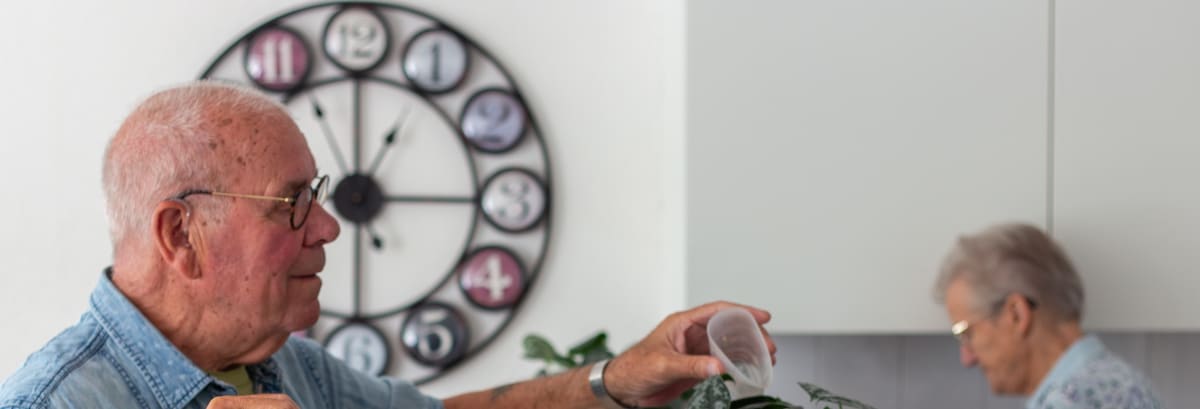Portrait Series on Reablement: 'It's Better to Let the Elderly Open the Door Themselves’
Published on: 08-11-2024
Reablement focuses on enhancing autonomy and self-reliance among the elderly. But how can we best support clients in regaining their independence? And how can care workers get used to working more 'with their hands behind their backs'? In this portrait series, we take you along with care organizations that embrace reablement in their practices. Today, we hear from a community nurse at Cicero Care Group.
Why is promoting independence so important to you?
"When I enter someone's house, I often think, 'Do you want to be dependent, living your life dictated by care routines?' Or, 'Would you rather maintain a positive outlook on life by keeping control over your daily schedule?' The latter is what I find important because, in my work, it's all about quality of life. People want to stay at home longer, and staying active is crucial to achieving that. It’s often the small moments that matter, like opening the door yourself."
What do you experience in your practice?
"I've worked in neighborhood teams where colleagues would open the client's door for them, thinking it would spare them the pain of getting up and reduce the risk of falls. But it's precisely this movement that keeps them active, preserving their mobility and preventing muscle atrophy."
How do you approach reablement for people with dementia?
"We work with a lady with dementia who lives above a shop. She can no longer operate the stairlift herself, and access to her home requires climbing a steep staircase. For her, it's especially important to keep walking. Otherwise, she’ll eventually have to leave her familiar environment. The temptation is there to spread her bread for her, but instead, I take her to the kitchen. Sometimes, I give simple instructions like, 'Lift your foot.' We stimulate her to keep moving because she wouldn't do it on her own. I explain to my colleagues that if you don’t move, your muscles weaken. Imagine this client needing to use a wheelchair in her upstairs flat—it’s impossible. Then moving away from her familiar environment would be the only option. That’s why it’s so important for her to stay mobile. Our care plan states that, by doing this, she can stay at home as long as possible. We literally stand beside the client to ensure that moving is done safely."
What inspires you to promote self-reliance?
"When I worked in a hospital, people with diabetes would come in to be put on insulin. The first thing they did was put on their pajamas and lie in bed. That was a trigger for me: that’s not how it works. We’re going to do things as if you're at home, because at home, there's no one there to do everything for you.
My 'aha moment' was realizing that having a condition doesn't mean you're sick. You have to make the most of what you've got."
Have there been moments when you wished you had done more to promote self-reliance?
"Yes, there was a woman who had been caring intensively for her husband, with our help. During that time, we encouraged her to also find something to do for herself, but she wasn't open to it. After her husband passed away, she wondered, 'What do I do now?' The world outside her door was no longer her world. She had little contact with others. I should have pushed harder, challenged her more."
How do you encourage self-reliance?
"By paying attention to whether people with physical limitations are less engaged in society. They can feel less significant and may focus solely on the care they're receiving, as it’s often the only aspect they have control over. They wonder, 'What time are they coming? Are they kind and caring?' But if you focus on their strengths and what they can still do themselves, it opens up a whole new world for them. They engage more in life, which helps them put things in perspective. They feel more meaningful, which reduces their dependence on care. We see clients truly flourish by taking up social activities again."
What if someone struggles to reconnect with society?
"Then we bring in individual support workers, especially for a 'VPT' (Full Package Home Care). They pay attention to wellbeing and take the time to have conversations with clients. They also check the fridge for expired food or see if someone eats the same thing too often or has dental issues. They see clients more frequently than care providers, which gives me time to consult with GPs and address other care needs."
How do you approach self-reliance within your team?
"I do this by discussing practical examples. A colleague, for instance, took over all showering tasks for a client, which led to the client becoming aggressive. It turned out that my colleagues were struggling to guide this client, who had dementia and depression, towards independence. Later, we discovered that the client might have had a history of abuse. This made my colleagues realize the impact of unnecessary and unwanted takeover. I often ask my colleagues, 'Why are you taking over? Why are you deciding how to do it?' We are here to support the person, not to make our jobs easier."
What tips do you have for others?
"During a care moment, ask someone, 'What did you used to do?' or 'What gives you energy?' It doesn’t have to be a heavy conversation. The key is to look beyond just care. It’s better to let an elderly person open the door themselves, even if it means waiting in the cold for a while. In that case, it's smart to call ahead to let them know you're coming. Also, pay attention to social contacts. One client once went to the Christmas market with neighbors. They stayed in touch, not just over the phone, but also visiting each other. See if someone can do their own shopping, so they can regain control and avoid receiving the wrong groceries from a child."
About Reablement
Older adults are living at home longer and want to manage independently as much as possible. 'Reablement' has become a popular topic in the Dutch VVT (nursing and care for the elderly) sector in recent years. Some see reablement as simply a new term for an old concept, while others view it as a modern, significant development. Everyone agrees, however, that reablement contributes to person-centered, life-focused care. Reablement fosters autonomy, personal direction, and self-reliance among the elderly.
About the Portrait Series
In the Reablement Portrait Series, we take you through care organizations that translate reablement into their daily practice. Also read the interview with a community nurse at Careaz.






